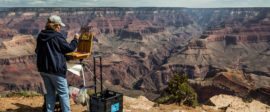Christian Artists Discuss Their Work (Video)
Video / Produced by TOW ProjectIn this video, New Testament scholar Sean McDonough argues from Matthew 6:25-33 that making art is godly work. Starting at minute 7:53 professional artists share how the Christian faith changes their approach to their work. This video is part of Jesus And Your Job, a video series on how Christians in different industries view their work. To find out more about this series and how you can use it as a small group study, go to the Jesus And Your Job homepage.
A Biblical Basis for the Work of Artists
Today we’ll explore the world of art, its status as work, and its relationship to Jesus’ teaching. We’ll start with a brief meditation on a passage from Matthew.
“Therefore I tell you, do not worry about your life, what you will eat or what you will drink, or about your body, what you will wear. Is not life more than food, and the body more than clothing? Look at the birds of the air; they neither sow nor reap nor gather into barns, and yet your heavenly Father feeds them. Are you not of more value than they? And can any of you by worrying add a single hour to your span of life? And why do you worry about clothing? Consider the lilies of the field, how they grow; they neither toil nor spin, yet I tell you, even Solomon in all his glory was not clothed like one of these. But if God so clothes the grass of the field, which is alive today and tomorrow is thrown into the oven, will he not much more clothe you—you of little faith? Therefore do not worry, saying, ‘What will we eat?’ or ‘What will we drink?’ or ‘What will we wear?’ For it is the Gentiles who strive for all these things; and indeed your heavenly Father knows that you need all these things. But strive first for the kingdom of God and his righteousness, and all these things will be given to you as well.
-Matthew 6:25-33
The main point of this scripture is not being anxious. Obviously, we should trust God who takes care of the world. But the subsidiary point that I want to focus in on today is the Lilies of the field and by way of comparison Solomon. In the Bible, beauty tends to hide at the level of the assumptions of the authors rather than becoming an independent object of interest. Jesus affirms as clearly as he could the beauty of the world. It’s the assumption of Jesus’ statements here.
The word beauty does not show up very often in the Bible. What does show up a lot is the word glory. I think we could make a very good argument that the glory of the Lord is intimately related to and maybe even in some sense identical with his beauty. When God is showing his glory in the world, he does it by way of showing his beauty.
God made the world both functional and beautiful. Therefore, when we make beautiful things, even when they have no apparent productive capability or no reason for being that serves some other purpose, it is valid for those works of art to just exist. Because God created the cosmos not only in a bare utilitarian sense to function. Just as much as anything, God created everything to be beautiful.
The Shakespere of biblical beauty quotes is a guy named Sergei Bulgakov. He was a Russian orthodox theologian from the early part of the 20th century. Bulgakov’s whole theology is shaped by an appreciation of God’s beauty, the beauty of the world, and art’s ability capture that beauty in some sense. Bulgakov wrote,
God is revealed to man not only as the wisdom of the world but also as its beauty. This means first of all that beauty experienced by man is not only a subjective human feeling which can perhaps claim to exist only as fashion of the moment. Beauty is an objective principle in the world revealing to us the divine glory.
This is the connection of beauty and glory which I think is interwoven subtly in the scriptures.
Of course, because we live in a fallen world, this experience of beauty is a bittersweet one. Bulgakov also writes about the pain of experiencing the beauty of Eden in a non-Eden place.
Edenic beauty in non-Eden in the kingdom of the prince of this world is to a certain degree theft and forgery, and thus it bites like a snake and ruins with its sweet poison. The adulterous woman clothed in satanic beauty opposes the woman clothed in the sun. Both of them compete and agonizingly struggle in the souls of men and women who have lost Eden but have not forgotten it and always pine for it. Languor on account of beauty, the torment of beauty, is the howl of the whole universe.
Only a Russian could write this stuff.
So, the world’s beautiful but broken and we’re kind of torn between these two things. What does art do? Here’s what Bulgakov says:
Art sees not the outward but the inward aspect of the object. It looks for the primordial idea of the object, an idea which is sometimes but slightly and dimly discernable through the outward covering. Things are transfigured and made luminous by beauty. They become the revelation of their own abstract meaning. And this revelation through beauty of the things of the earth is the work of art. The world as it has been given to us has remained as it were covered by an outward shell through which art penetrates as if foreseeing the coming transfiguration of the world.
Bulgakov uses the word transfiguration quite deliberately, alluding to Jesus on the mountain when he is temporarily transformed so that his disciples see the divine glory radiating out of him. Art, amongst other things it might do, helps capture the glory resident within creation, and bring it out into an artifact. That way we can really appreciate what God has intended creation to be.
Carmela's story:
I am a visual artist, a painter. When I’m painting my mantra is, “By the power of your spirit, to the glory of your name.” I’m not looking at anything generally when I’m painting, so it really is a question of having faith that God will produce something out of what I’m trying to produce.
Artists tend to like the phrase, “Trust the process.” Abstract artists particularly like the phrase, “Trust the process.” For me it’s trusting God in the process, that something will come out of it that doesn’t end up in the trash can.
Jeff’s story:
I direct theatre. The thing that I’ve enjoyed most about directing is it allows me to bring out the best in others. That’s what I really love. When I can work with a student, or an actor, or a musician and help them bring out gifts that they have, nothing brings me more joy. I don’t need to be in front. I love watching those people do their thing because I really believe that’s how God works and how his spirit works.
I have struggled to find support within the church for the work I do. Perhaps the most difficult times I’ve had as an artist have not been from any kind of secular critics but from the church. In the theatre if you say a certain word or portray a certain situation and you get letters, you get calls. I’ve been called a demon. I’ve been said to be unsaved because of certain productions I’ve put on.
The verses from Philippians, “Whatsoever is good, pure, true, think on these things” have been thrown at me. People have used them to hit me over the head with, like with a bludgeon. I do believe in those things -- I think we are called to think on good things. But by that standard, you can’t read most of the Old Testament. So I think we have to ask of art, What is the context? There’s an appropriate context for being prophetic as an artist, which means calling attention to that which is hollow, cheap, evil, and wrong in our culture. As artists we are sometimes called to do that. That’s harder. It takes you into areas that are difficult. I think it’s also a priestly function of an artist to hold up that which is good and valuable and worthy, and say “think on these things as well.” But the hardest thing has been people from the church. And that’s always been a surprise to me because my heart is wanting to serve the gospel and wanting to serve Christ and raise themes that are important.
I dare to create because I see something that’s bigger than me, more valuable. I think I got that daring in church. Growing up in the church I heard about David, and Nathan who had the tenacity to stand in front of David and confront him by telling a story. He was pointing to something bigger. For me that’s the only thing that can make me dare. I just don’t have it in me otherwise.
Ginny’s story:
I studied art history in college and I worked as an artist professionally before I had children, doing representational painting. I recently went back to school to study that kind of painting in greater depth, and while I was there I met tons of artists who are far better than I will ever be, all struggling in anonymity and afraid to really put themselves forward. I thought, “Well, I have no problem putting you guys forward because I know how hard it is and I’ll never be where you’re at.” I always had it in my mind that someday I’d start an art gallery, although I have three small children so I really didn’t think it would be now. But a bunch of doors just kept opening and last year I opened an art gallery in downtown Wenham called Williams Fine Art Dealers where I represent about 20 artists from all over the country.
When you can cheerlead other people and encourage them in their gifts, that’s God-honoring on so many levels. Artists so often tie their worth to their work. You have a great sale or a great show and you think, “I’m awesome!” Then you get rejected and you’re down in the dumps. I love just being an encouragement and an even keel for a bunch of these artists, so they will continue doing what they’re doing and not throw away their paint brushes for a couple years.
On the wall coming into the gallery I put up the quote from Ecclesiastes, "Whatever your hand finds to do, do it with all your might." This was best for the wall, but really I was thinking of the verse in Colossians that says, "Whatever you do, do all to the glory of God." I just think that’s what you have to keep in mind.
Discussion Questions:
- How is beauty connected to God’s glory? How does man-made beauty reflect God?
- Is your experience of beauty tinged with bitterness, as Sergei Bulgakov posits? Why or why not?
- Jeff struggles to find support within the Church for his work, even though he’s inspired by the Bible and the Holy Spirit. Is there something about your work that your friends at church don’t understand? Do you ever feel penalized or “less than” because of your occupation?













